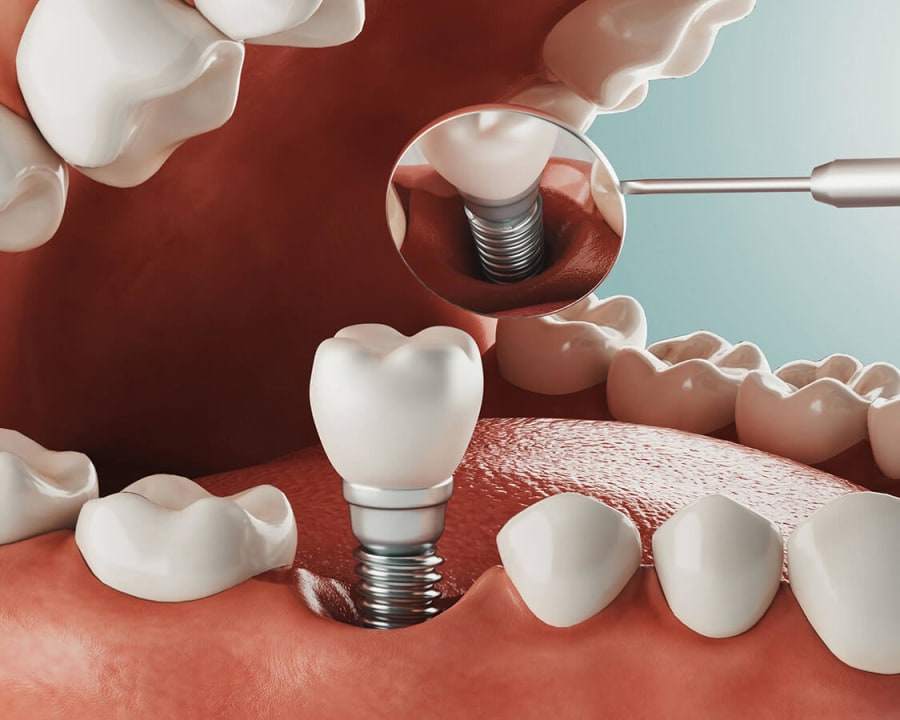What is a Dental Implant?
A dental implants is titanium screw that can be used to replace the root of a tooth. This screw is surgically placed where a natural tooth has been extracted or lost and, after the area has healed, a crown is attached to the implant.
Implants are able to support artificial teeth that are designed to feel, look and function quite closely to a natural tooth.
Dental implants can be used to replace a single lost tooth or multiple missing teeth and may address oral health issues while leaving you with a functional, natural-looking smile.

The Implant Procedure
For many people, dental implants are an ideal tooth replacement option. They are made of titanium metal and placed below the gumline.
During the months following the placement of implants, the bone surrounding the implants grows and holds the implants in place. This allows the implant to act as a replacement for the root structure of the missing tooth.
After the implant has been placed and the surgical site has fully healed, your dentist will attach an artificial tooth to the implant, connected by a small metal piece (also known as an abutment), creating the appearance and functionality of a natural tooth where the gap in your smile once was.
Dental Implants FAQs
Learn more about dental implants from some commonly asked questions.
-
What types of dental implants exist?
Two of the most commonly used dental implants are endosteal implants and all-on-4 implants.
Endosteal implants are the most common dental implant option. They are comprised of a titanium metal rod that is installed into the jawbone and a supporting post that is specifically designed to secure either a dental crown or a dental bridge.
All-on-4 implants are a dental implant system in which an entire top or bottom denture is supported on just four implants. Each implant is strategically placed so that the replacement teeth remain steady and secure. The advantage of using four implants is that it helps promote faster patient recovery and reduces the likelihood of complications from possible implant failure.
-
What are the benefits of dental implants?
A person suffering from tooth loss will experience many challenges. The most obvious of these challenges are difficulties when chewing and speaking clearly.
When tooth loss is left untreated it can result in very serious problems like tooth shifts, jawbone deterioration, facial structure loss and bite imbalances.
These issues usually develop over time when there is no root system to maintain bone health and alignment.
Dental implants provide an artificial root system to maintain order and keep the remaining teeth in line.
They can not only help a patient overcome short-term challenges; they can also prevent long-term problems linked to tooth loss.
Many people consider dental implants to be the most effective method for treating tooth loss because the implants serve as an artificial root system for supporting a prosthetic tooth and allow replacement teeth to feel more natural.
-
What is the procedure for dental implants?
The first step is having the dentist consult and visually examine the site in the mouth where the dental implant is being considered.
Then the oral surgeon needs to consider if there are any current teeth that need to be extracted and which type of bone graft needs to be conducted.
These procedures will take place first and the patient will be allowed a few months to heal to ensure an adequate and strong bone is present at the site of the implant.
Once this is determined, the dental implant is placed into the bone and a healing cap is placed over the implant so the healing phase can begin.
This is followed by regular check-ups to ensure proper healing and no infection around the place of surgery.
Once the site of the implant has completely healed an artificial tooth will be added.
-
Will I be able to chew normally with a dental implant?
Chewing will often improve significantly following the placement of a dental implant. In fact, after a brief period to get used to your new implant, you may be able to chew almost as well as you would with your natural teeth.
-
Will the dental implant procedure be painful?
You are unlikely to experience major discomfort during and after the procedure. Your dentist will review anesthesia options with you and plan your procedure based on the wishes you express. However, dental implant placement is usually completed with local anesthesia.
